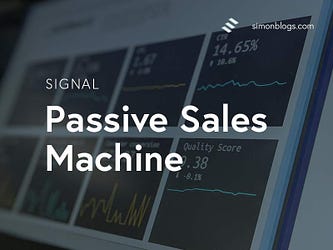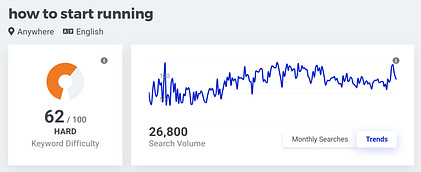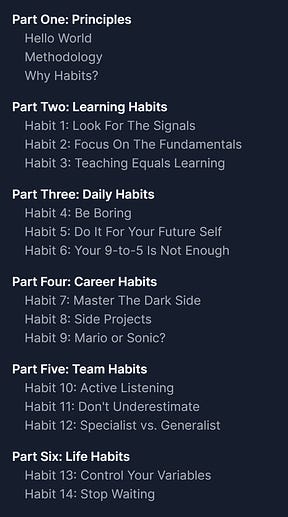 |
Hey Everybody!
Starting things off on a bit of a sad note (it gets better though!): I’m moving the Signal over to a bi-weekly schedule. I’ve just got too much on my plate with Build A Business kicking off, and a full time job running another company, as well as having a finger in a few other pies.
I also never want the quality to drop. I intend to keep my promise of constant improvement. To do that, I need more time, and more resources.
If you have any feedback on this - I’d love to hear it. Any ideas?
If you want to follow along with how a business get’s built every week, Build A Business is where that happens. This week we’re at the Idea Stage. The post goes in deep on two business ideas, and gives the readers a choice on which they’d like to build along side me. Each has their own case put forward.
Next week we’re going to be validating the chosen idea further.
I am terrible at monetizing. But I read something today that helped: Money is oxygen. It’s oxygen that makes the fire that people are huddling around for warmth bigger.
I’ve priced it to be as accessible as possible, but enough to enable me to create the best content.
🚀 Startup Labs
// A business idea, explored
📖 An [Insert Area of Expertise] eBook
Not all startups have to be sexy businesses. Get that notion outta your head. It’ll kill any progress you make on your journey towards building yourself a big business one day.
It is very seldom the case that extremely successful startups are the product of first-time entrepreneurs. If they are, it’s mostly because they had a ground-breaking idea that attracted a lot of money early on, and they were able to surround themselves with an excellent team.
For the most part though, successful businesses are the result of ‘multi-preneurs’ (definitely not a word) - guys and gals who have done the hard yards in the years before they got to where they are.
They built scrappy little businesses that taught them valuable skills they were able to apply.
My first company was the perfect example. It was a tiny little D2C company in a very small niche. Started as a passion project. I (very luckily) sold it for a small amount, but the real value was in the lessons I learnt during that process.
So, with that preamble out the way, here’s this week’s idea.
⚡ The Opportunity
An eBook, based on any hobby of yours.
I know, I know. I can hear you saying “Not another eBook idea”, but this is going to be a framework approach for one of the easiest ways to generate a solid income, with almost no ongoing work required.
The difference is going to be that I teach you the system for selling your eBook, not just creating it.
For the sake of brevity, and clarity, I’m going to pick a hobby of mine and continue with that idea. But you could swap it out for any area of expertise you might have. There might be a few subtle nuances that you’ll have to alter, but the process is mostly the same.
📈 Gameplan
Choose A Subject
Get out a sheet of paper and start writing down all the things you do in a week. Hobbies, chores, work - anything.
Look at your list. Is there anything in there that you either:
Know an above average amount about;
Spend an above average amount of time doing;
Are naturally talented or gifted in.
Also think about where different skills and experiences of yours cross in unusual ways.
For example: I’m a qualified Mechanical Engineer. But I love tech and software. I’ve used the design principles I learnt in my degree in designing software for our tech company. That process seemed obvious to me.
But when I sat down with an experienced UX designer and he asked me how I came up with - what he seemed to think was a very novel idea for user onboarding - it dawned on me that the way I was doing it wasn’t the norm.
Use those combinations of skills and experiences to your advantage.
Where’s your niche? What can you teach? What do you know that other people should?
The trick here is to be hyper-critical of yourself. Just like in the example above, the majority of the stuff we know - we take for granted. We don’t actually realize that our particular set of skills is unique. Be cognisant of this.
My idea: How to Start Running.
Validate
The validation here is pretty simple. In the search term below, there is significant intent. And because there is a very healthy monthly volume - there is clearly a number of people with this problem.
We will go and find further long-tail keywords to go after later. But for this step, this’ll do.
This is my ideal search term:
 |
26.8k Monthly searches, at an average CPC of $0.38. Keyword difficulty is irrelevant for now. I don’t want to wait months for my content to start ranking. This is going to be quick and simple arbitrage using ads.
Data from Mangools.
Depending on your topic, you might need to do a bit more validation.
Investigate
Look at different forums for pain points.
Quickly gave evidence to the C25k app for beginners. Great - market 100% validated. The C25k subreddit has 114k members.
C25k app has the following features:
A vibrant community of people sharing progress pictures
A standardized training plan where members are able to post, “I’m at W2D3” (week 2 day 3).
Quora
Use a tracking app
Have a “Why” - a goal race helps
Music
Eating after a run
Most Socially Shared
“How To Start A Running Routine” - 53k Pinterest shares
“How To Start A Running Habit When You're Totally Out Of Shape” - 26k Facebook shares
“How To Start Running: A Beginner’s Guide” - 1.6k Facebook Shares
Content
You know what pain points you need to cover from the above.
Here are mine:
Routine
Sticking to it
Motivation to get out of bed
Running partner
Dog
Running if you’re overweight
Running for weightloss
Cycling
Intervals
Walk run method
Morning or afternoon running
Running technique
Training programme
Calories
Workouts
Gear advice
Diet for running
First race
C25k
So, based on the above, it’s time to actually map out (don’t write) the eBook.
My process is as follows:
Collate all the above topics into simliar groups. Example: Workouts, Intervals, Walk-run method, training programme will go together.
Find the theme of the group and then give it a name. Example: Training Plans
You’ll now have most of the chapters of your book. Next, fill in any glaring omissions for chapters. Include Introduction etc.
Now, take your experience and fill in the gaps. What’s missing in each of these chapters? By the end of this step you want a fully fleshed out ‘wireframe’ for the content in your book.
Don’t worry if this is not perfect and you’re worried about missing bits. When you actually start writing you can alter. The purpose of this for now is to be able to sell the book.
Here’s an example of what your wireframe might look like:
 |
[From 14 Habits of Highly Productive Developers]
Email Drip
This is our selling machine. It’s going to be a dynamic beast that you’ll be constantly updating as you get feedback and make some sales.
The idea is this:
You drive traffic to a landing page.
The landing page sells you on an idea (Mine is learning how to run), and asks for your email address and first name only. There’s an option to buy straight away, but only well below the fold.
The email is used to send the prospect a drip campaign that is specifically designed to convert them into a paying customer.
See the Skill Builder section below for how to setup an email drip campaign, or get the structures and examples here.
Website
The website is where we’re going to capture the leads to funnel into our drip campaign. It needs to be fast, user friendly and most importantly - have a high conversion rate.
Some quick landing page builder options:
Because I’ve been using WP for years, and I’ve got a theme that I can spin up a landing page on very quickly, I always go that route. Any of the above will do the trick.
This will be my structure (sections):
Minimal header: No menu options
Hero: Benefit headline + sub-header + mockup
Call to action: Sign Up Form
Features
Social proof
Call to action: Sign Up Form
More features (External interviews to give credibility)
What’s Inside
Testimonial Section
Call to action: Buy Now
FAQ’s
Minimal footer
Remember to install Facebook Pixel and Google Analytics right from the word go. If you plan to use other ad services like Reddit, Twitter or Bing, install those too. Get that data!
Ads
The choice of ad provider is largely going to depend on two things:
Your niche (Where do they hang out online)
Cost
In general Bing ads have most of the benefit of Google Ads, but they’re cheaper to get started for testing. Much lower volume when looking to scale, obviously.
Facebook ads are great for very specific targeting. Can be expensive, depending on your niche.
Reddit ads seem to be hit and miss. Some people have had success, some blast through their budget at 10% of the conversion of Facebook ads. The trick I’ve found is being a part of the community prior to advertising to them, and then being able to craft a specific message according to your experience of how that community interacts. The dark arts I tell you!
I don’t have much experience with Twitter ads.
The number one thing to remember is that this is a fairly simple arbitrage exercise. You have almost no cost of sales aside from the fee from the platform through which you sell your eBook. I use Gumroad - they take 10% of your revenue.
So, you can’t spend more than 80% of the purchase price per paying customer on ads. It’s simple maths. Ideally, you don’t want to be anywhere near that amount of your sales price, but you get the idea. Make sure you stay on top of your conversion ratio from email sign ups through to purchased eBook.
I’ll be going more in depth on digital ads in a later Signal.
Marketing
Ads are not the only way to sell copies or get sign ups. Here are some others:
Find influential individuals in your space who you can send the eBook to for free, in exchange for some exposure. Be tactful. Send first, engage, then ask (if your content is valuable enough, you probably won’t have to).
Post in groups: Reddit, Facebook groups etc.
Economics
Taking my running book as an example, let say we’re able to drive half the average search traffic for only one keyword (as above). That’s 13.4k users to my landing page per month.
30% of those sign up to the email: 4k-ish
1% of those buy the eBook: 40
eBook sale price: $29
Monthly revenue = $1160 USD
That is for only one keyword being targeted.
For 50k monthly visits (same metrics as above): $4350 USD monthly
For 100k monthly visits (remember how many users sub to the r/c25k subreddit): $8700 USD
Then you have an opportunity to sell further products to this DB using exactly the same formula. You can even ask them what you want to sell.
Pretty soon you’ll have a nice little income stream that has the potential to reach 6 figures per year. The best part? Even if you’re grossing a few hundred bucks a month - it’s mostly profit.
🗳️ Vote
Which of these ideas do you want to go through next week? Click the link to vote.
🛠️ Skill Builder
// A skill to add to your founder’s toolbox
📧 Sales: Educational Email Drip Campaign
A good drip campaign essentially nurtures a lead from a ‘cold’ state through to a sale. It’s a sales process, that when done effectively, can bring you a constant source of leads or sales.
The process works as follows:
Your leads enter the funnel (normally all at the same point). At this stage they are very ‘cold’ - they know very little about your product, but they’ve expressed intent in the subject because they’ve given you their email.
You send them a series of pre-crafted emails (based on either time, or engagement) that take them through a funnel. The idea is to warm them up to your product so that when you present them with an offer, they’re primed to buy.
More complex drip campaigns will have different nurturing/drop off cycles which bring leads back into the fray, based on how and when they dropped off or didn’t respond.
The fundamentals behind a good educational drip campaign:
A hook. This can either be the educational content (teach something) or something physical - like a download.
Provide value, first and fore-most. If the lead drops off at any stage of the process, they should leave having learnt something. If that isn’t the case - you’re not providing value. Grab attention by offering this for free.
Get on the same page as the person you’re advertising to. What is the itch they need to scratch? How do they know you’ve experienced it too? Case study.
Explain what life is like when this itch has been scratched. Sell the benefit. Customer story.
Demonstrate your expertise in the field. Show how your method works and why it’s successful.
Call to action. Multiple times. Put a deadline on it. Urgency/scarcity creates sales.
Here are some copywriting tips for crafting your message:
Know exactly who you’re speaking to, and what their hopes, dreams and desires are;
Speak directly to that person, as if they’re the only one in the room;
What questions are they asking themselves internally: “Enter the conversation that your prospects are having in their mind”;
There’s always another level. Go deeper, get more intimate, connect more.
If you’d like more information on how to build the ultimate passive sales machine using drip emails, check this out.
📣 What’s-a-Twitter
// The tweet of the week, from someone I follow over at @simon_blogs
A little bit more sentimental than usual, but super valuable for anyone on anyone on the entrepreneurial journey:
(Julia is a business analyst for The Hustle)
🖱️ Clickworthy
// Valuable tidbits from around the interweb
🎯 What is the real goal? Is it to read more books or understand what you read? One of my favourite editions of James Clear’s 3-2-1 Newsletter.
🛠️ A tool for watching how your users interact with your onboarding process. Excellent for monitoring drop-offs and improving conversion rate.
💼 A full (Google Docs) book on growing a productized service business.
📖 I’m currently four chapters into Mastery by Robert Greene. So far, an excellent read.
👋 The End Notes
That took me quite a while. I hope it was valuable for you. If it was, consider sharing it with a friend:
If you’re the friend who got this shared with you, you can sign up here:


